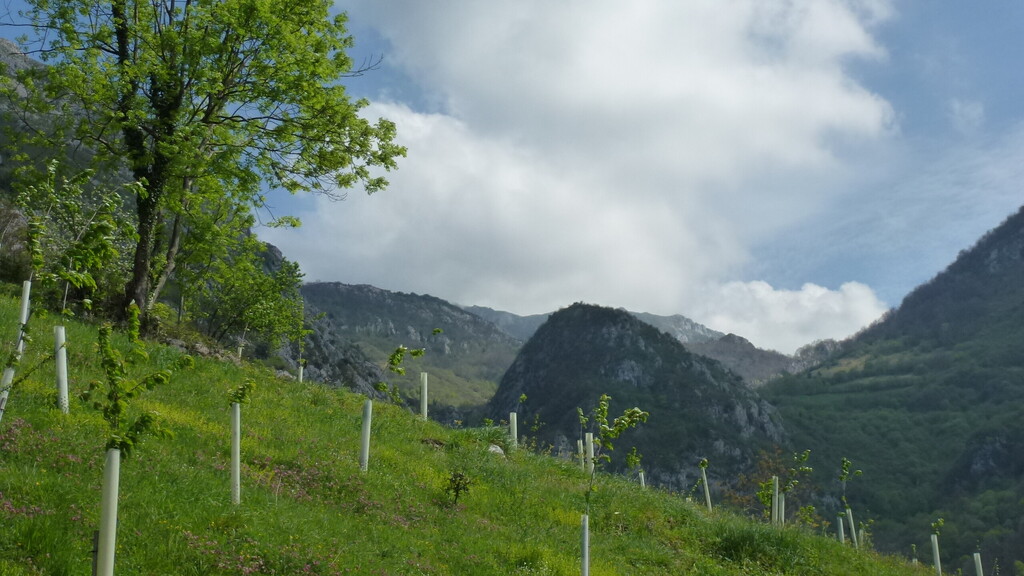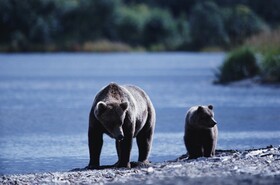

In northern Spain there is a large mountain where bears are still living. But their existence is threatened because they still are hunted illegally and there is a lack of food especially at summer. Due to this the bear mother has difficulties to raise her children. Fruits an forest fruits are a big part of their food. This is why we are planting fruit and chestnut trees in their habitat together with FAPAS.

Start: April 2015
End: still open
The Cantabrian mountains are a mountain range in northern Spain and run through the autonomous regions of Navarre, Basque Country, Cantabria, Castile-Leon, Asturias to Galicia.
The mountains are a western extension of the Pyrenees and extends over 480 km.
Since the mid-1990s Fapas fights for brown bears and tries to secure the area in northern Spain as a habitat for the animals. Another partner is Iurid.

The Cantabrian mountains in northern Spain are a green extension of the Pyrenees and extend over 480 km along the Spanish Atlantic coast. The large mixed forests of the mountains offer a habitat for a unique biodiversity. Besides capercaillie and chamois, there live also the last brown bears in Spain. Unfortunately they are in acute danger of extinction.
Even if it is strictly forbidden, there are a lot of poachers who are still hunting the impressive animals. Due to this, the population of the bears in the eastern part of the Cantabrian mountains fell since the 1980s from 30 to 5 animals, including only one female. If no miracle happens, this bear population will decline.
Luckily in the west of the Cantabrian Mountains, the bear population was able to recover. This was achieved thanks to our partner FAPAS, a Spanish nature conservation organization. FAPAS used Ranger in the heartland of the poachers and was able to contain the killing of the endangered animals. The western bear population has grown from 80 to over 200 animals!
The European brown bear is a carnivore, but about three-quarters of its food consists of herbal ingredients. A peculiarity of the bears in Spain is that they do not hunt in person, but eat the animal carcasses left by other predators or humans.
One of the favorite foods of the bears are fruits and nuts. In summer, the bear mothers feed their cubs almost exclusively with fruits and nuts. The more fruits and nuts the bear cubs eat, the better they come over the winter.
Unfortunately, more and more farming families leave the lonely mountains and move to the cities. The orchards and fields with crops are no longer maintained and rot. The bear mothers then often have problems feeding their young during summer. Therefore, Naturefund and FAPAS plant fruit trees for the bear mothers and their cubs.
Join us! For just 6 € you can plant trees for the bears and help them to survive!
The highest peaks of the Cantabrian Mountains are in the central mountain range Picos de Europa, whose highest peak is the Torre de Cerredo mountain (2,648 m). The Picos de Europe are a giant limestone body.But the species-rich mixed forests of the mountains are increasingly being replaced by monotonous monocultras.The construction of wind farms, ski resorts and motorways destroys the habitat and food sources of the rare brown bears and other animals. The rural exodus is also a big problem. Orchards and fields with crops are becoming increasingly rare. One reason why the natural food supply in the Cantabrian Mountains has declined more and more in the recent years, is the disappearance of the bees and thus the pollinators of fruit plants.
Fapas has initiated various measures to protect animals. The strong presence of Rangers in the heartland of poaching are specifically effective. In addition, a comprehensive monitoring program has been established, which collects data on the distribution, population density and lifestyle of brown bears. In recent years, valuable information has been gained and effective protection concepts were developed.
Thanks to fapas, female bears are raising their cubs again in areas where there has been no young bear for decades. In the western part of the Cantabrian Mountains poaching was greatly reduced. Bear stocks have already recovered a bit.
Read here what others have written about the project.
Sorry, there is no comment for this project yet. Write the first one!